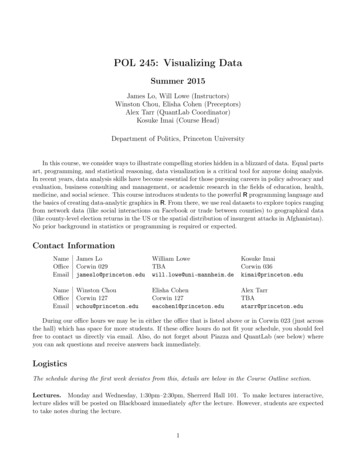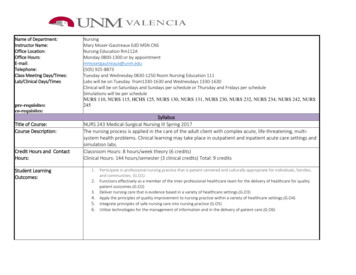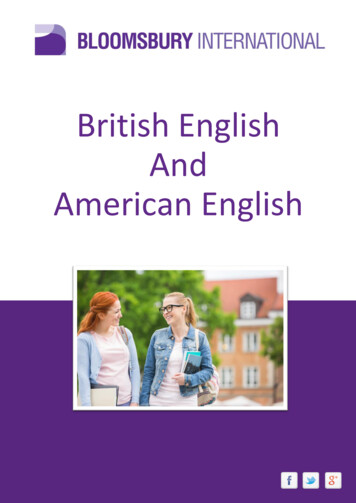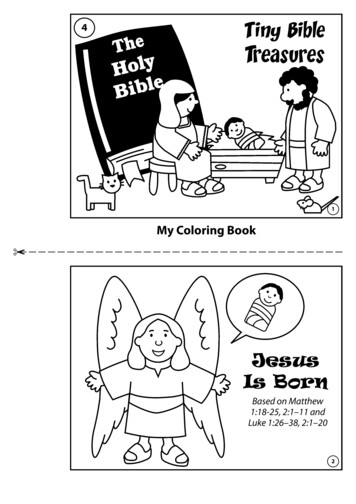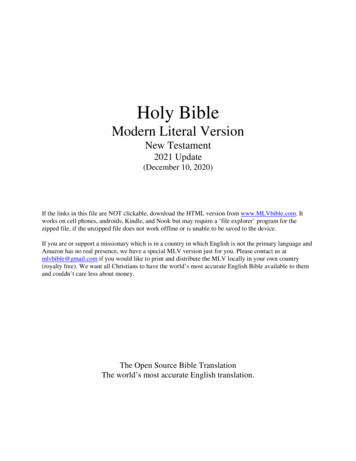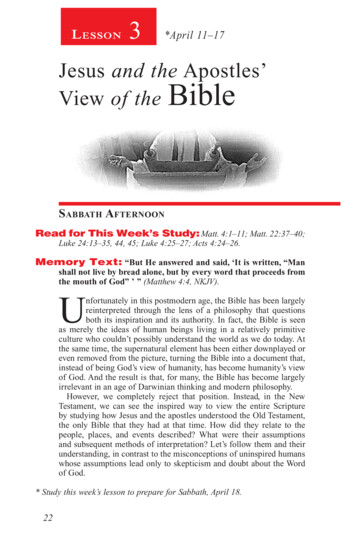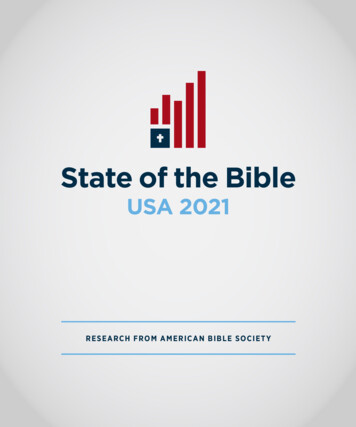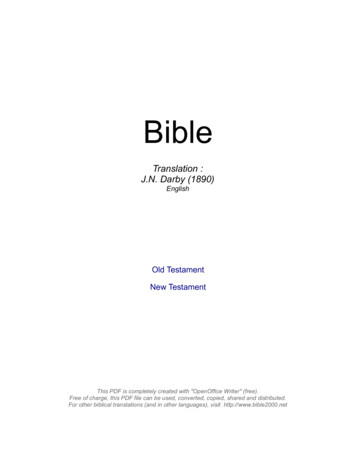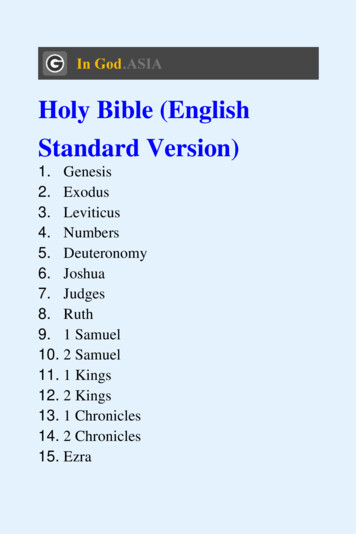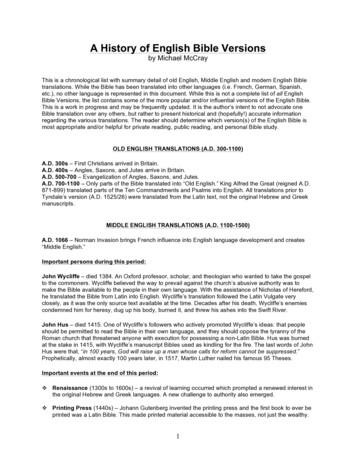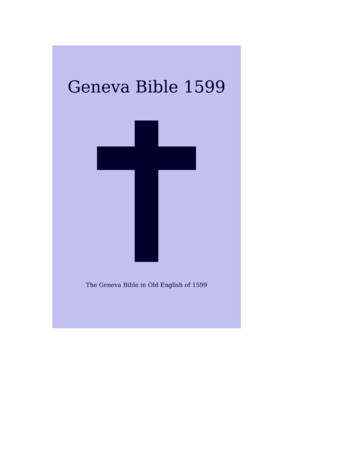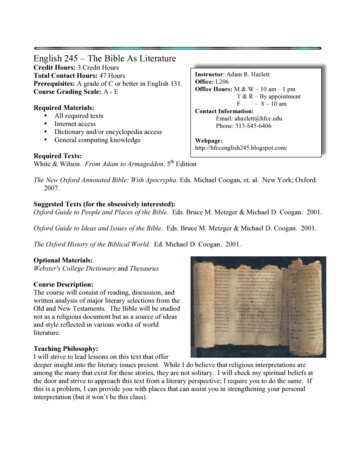
Transcription
English 245 – The Bible As LiteratureCredit Hours: 3 Credit HoursTotal Contact Hours: 47 HoursPrerequisites: A grade of C or better in English 131.Course Grading Scale: A - ERequired Materials: All required texts Internet access Dictionary and/or encyclopedia access General computing knowledgeInstructor: Adam R. HazlettOffice: L206Office Hours: M & W – 10 am – 1 pmT & R – By appointmentF– 8 – 10 amContact Information:Email: ahazlett@hfcc.eduPhone: .com/Required Texts:White & Wilson. From Adam to Armageddon. 5th EditionThe New Oxford Annotated Bible: With Apocrypha. Eds. Michael Coogan, et. al. New York; Oxford.2007.Suggested Texts (for the obsessively interested):Oxford Guide to People and Places of the Bible. Eds. Bruce M. Metzger & Michael D. Coogan. 2001.Oxford Guide to Ideas and Issues of the Bible. Eds. Bruce M. Metzger & Michael D. Coogan. 2001.The Oxford History of the Biblical World. Ed. Michael D. Coogan. 2001.Optional Materials:Webster's College Dictionary and ThesaurusCourse Description:The course will consist of reading, discussion, andwritten analysis of major literary selections from theOld and New Testaments. The Bible will be studiednot as a religious document but as a source of ideasand style reflected in various works of worldliterature.Teaching Philosophy:I will strive to lead lessons on this text that offerdeeper insight into the literary issues present. While I do believe that religious interpretations areamong the many that exist for these stories, they are not solitary. I will check my spiritual beliefs atthe door and strive to approach this text from a literary perspective; I require you to do the same. Ifthis is a problem, I can provide you with places that can assist you in strengthening your personalinterpretation (but it won’t be this class).
Expectations of the class:1. Classroom Respect: When writing about and expressing viewpoints THINK. Beyond personal responsibility andrespect for others, you must have RESPECT for yourselves and responsibility of how they perceive you. In this class,we will be sharing and expressing divergent viewpoints on a number of issues. Therefore, it is important to rememberthat ideas are not always indicative of the person espousing them.2. Attendance: While this is an online class, you will be expected to cometo campus for a midterm examination and a final examination. I will beannouncing the dates/times of these exams shortly after the beginning of thesemester. You should note, also, that taking online classes requires you tonot only log onto the websites but also complete reading in a timely fashionand complete other independent research on your own time.3. Academic Dishonesty: Plagiarism is probably the number one offense inthe realm of academic dishonesty. Plagiarism is defined as intentionallytrying to pass another’s writing, work, words or ideas off as your own. Wewill learn that academic writing requires us to cite, paraphrase and quoteanother’s work, but we will also learn that we must cite from where we received that information. I always follow therule that it is better to have too many citations then none at all. When in doubt CITE! See college academicdishonesty policy on the webpage and/or catalog. Beyond the stated policy however, I take personal offense to actsthat assume me to be a moron.4. Late Work: I do not accept late work! The deadlines and due dates are clearly stated in the syllabus. As thisclass is online you must take it upon yourself to set a schedule and complete work early if you have otherengagements. Life happens and I understand this; you should, however, take into account that sometimes internetaccess is slow and sometimes the electric goes out. Have a back-up plan and a back-up to the back-up plan .If you fail to turn in your work on time, you will have missed the opportunity to receivefeedback from me, you will receive a zero for that assignment and you will forfeit youropportunity to revise the assignment for a better grade – NO EXCEPTIONS. I will give youplenty of notice about exams and essay due dates. If you are not going to be present the daya project is due, you need to make arrangements to complete the assignment EARLY. I donot grant extensions at H-Hour; if you have LEGITIMATE problems, get a hold of me early.When in doubt, call me and let me know what is going on.5. Availability: My office hours are clearly marked on this syllabus. You should make allattempts to see me during these times. If you do plan to come into campus, give me notice sothat I can section off some time for you (my online students take priority in face-to-facemeetings). If these times do not work, please contact me to make other arrangements. I amsometimes on campus in the evening for unscheduled work.6. Reading: I expect every student to complete all reading assignments. Likewise, handouts that are given in classare given because they will benefit you. Therefore, treat all classroom handouts and assignment sheets as readingassignments; read them thoroughly7. Collegiality: This course is a college course and I expect everyone to act as such. On top of the other policies inthis class a few other things should be mentioned. All course communication should occur with the notion that youare contacting an English teacher. Proper sentence structure, punctuation and letter format are not only desirable, theyare required! Any email that is not will be returned pending revision; this is a writing class.
This is an academic environment where your commodity is an opportunity for an education. You neither pay for agrade nor a lecture; you pay for the environment in which you may foster knowledge, responsibility and propercommunication/thinking skills and overall knowledge.8. Study Cells: After the first week of class, you will be assigned a study cell. You will share contact information inorder to let this group of three people will act as a support group for any member. When you have a an interestingargument you’d like to bounce off someone, forget how to complete an assignment, have a clarification question, etc.,your study cell members will be the ones to assist you. This system has worked wonderfully in some of the world’sfinest liberal arts institutions. Since this is a liberal arts class, this system will work for us wonderfully as well.Assignments: Reading response questions– ongoing (posted to UCompass weekly) Midterm & Final examination – objective and essay questions Major writing project – 1500 word researched literary analysisReading Response Questions: This semester this course will be using the“Shared Inquiry Method” to analyze the Bible as a piece of the world’sgreatest literature. Many anthologies and lists of great works of art list thisbook as a major influence in Western art, literature, thought and philosophy.Therefore, you will be using the “Shared Inquiry Method” to prepareinterpretive and evaluative questions about your readings in order to explorefurther what you are studying.You are required to post these questions weekly to the UCompass Discussion board. You must also post at leasttwo responses to your other classmates questions. These responses might included multiple posts but you wantto engage the questioner in a conversation about the topic. This conversation requires you to also monitor yourown questions to engage with those who attempt an answer at your questions.These posts will act as an organic reading journal and will be graded monthly. Your questions are due byWednesday at 8 pm every week and your responses must be completed by Saturday at 8 pm.Midterm and Final examinations: There will be two (2) objective & short answer examinations in this course.The Midterm will take place during the week of the following: Monday, October 19th – Friday, October 23rdThe Final examination will take place during the scheduled finals week running December 15th – 19th.These exams will consist of twenty (20) objective multiple-choice questions and two (2) essay questions. Theseexams cannot be made up after the scheduled dates. If you cannot be in class on the above days, please makeadvanced arrangements with me to take the exams early.Major Writing Project: This 1500 word minimum (5-6 page) essay will do the following: Discuss the essential qualities of a particular genre such as myth, epic, poetry, narrative, proverb,legend, prophecy, epistle, parable, sermon Identify the relevance of a specific literary passage in the Bible to the Testament in which it appears interms of theme and genreThis project should have a thesis, primary evidence from the Bible and secondary evidence from credible,academic sources. Also, you should follow MLA guidelines for works cited information as well as in-textcitation or footnotes. More information will be posted on the blog and UCompass pages.The essay is due Tuesday, December 1 st by Noon! You will be submitting it via UCompass.
Measurable Course Objectives:1. Formulate an interpretive thesis (as opposed to one which merely reports something factual)2. Compose an essay which either:a. Discusses the essential qualities of a particular genre such as myth, epic, poetry,narrative, proverb, legend, prophecy, epistle, parable, sermon; orb. Identifies the relevance of a specific literary passage in the Bible to the Testament inwhich it appears in terms of theme and genre.3. Identify a range of the following key terms that are essential to an understanding of the Bible asliterature: testament, literature, genre, myth, allusion, epic, plot, character, setting, theme,allegory, simile, metaphor, irony, proverb, prophecy, dramatic narrative, epistle, parable,midrash, apocalypse, millennium, exegesis, Pentateuch, Apocrypha, Synoptics, and Wisdom.4. Identify the primary historical periods and locations that serve as the “setting” of the Bible.5. Identify the eras during which the Bible evolved from oral tradition to written document.6. Identify languages in which principle Biblical testaments were originally written.7. Identify the English translation of the Bible that has most directly influenced English andAmerican literature.8. Identify Biblical passages that focus on the theme of racial, ethnic, cultural, national, class, orgender identity.Grading:Major Writing Project (Due Dec. 1st)Midterm ExaminationFinal ExaminationWeekly reading questions and responses/conversations30%20%20%30%Schedule:See blog at http://hfccenglish245.blogspot.comOne final word Perhaps the most valuable result of all education is the ability to make yourself do the thing youhave to do, when it ought to be done, whether you like it or not; it is the first lesson that oughtto be learned; and however early a man's training begins, it is probably the last lesson that helearns thoroughly.Thomas H. Huxley
Course Intellectual/Theoretical Policy1 :Because this course’s primary text is one that has caused many a controversy throughout history, a statedtheoretical lens for this course should be explicitly made. The ground rules for classroom conversation,academic research, and writing should be as follows:1. The Bible should be treated as a human document. Whether it is the manifest word of God is aquery for each individual’s personal faith and should remain outside of this academic realm.2. The Bible is a collection of texts written, revised, edited and collected by different people at variousperiods of history. All of these collectors had their own contemporary aims and objectives, and allare distant in time and culture from the members of this course. We will not read the text in itsoriginal language but in an academic translation, and every translation is in some way aninterpretation. To read and interpret the Bible as if its meaning were simple, clear and obvious to thecasual reader, is to, according to Becker, “violate all that we know about language as well as all thatwe know about social and cultural change. ”3. There is a long lineage of scholarlywriting/argument about the Bible thathas lead to an existing body ofknowledge. It is a general rule ofcourses like “ The Bible as Literature ”to introduce the student to such a bodyof knowledge. Some may see ascholarly application of literary theoryto such sacred texts as sacrilegious andevil and practitioners of said theories asatheists, pagans or enemies of God. Thisattitude does not help one pass a college“ Bible as Literature ” course. However,as Becker reminds us “ it is also truethat most biblical scholarship is carriedon by people who are practicingmembers of the various biblical faiths,and that among these scholars the Bibleis no longer a source of religiousdivision. There is much generalagreement among scholars, whetherProtestant, Catholic, Jewish, or nonbelieving. ” See Becker’s notes onfundamentalism24. Being that this course is the rare instancewhere knowledge may confrontreligious faith, we will adhere to the“ assumption that human knowledgemay not only call religious faith into question but may enrich it as well. Thomas Aquinas definedtheology as ‘faith seeking understanding ’; in other words, a critical intellectual understanding ofwhat one believes is a good thing. 31Adapted from Dr. John E. Becker (Fairleigh Dickinson University) at http://alpha.fdu.edu/ jbecker/index.htmlhttp://alpha.fdu.edu/ .edu/ jbecker/bible/biblesyll.html2
TENTATIVE SCHEDULE FOR ENGLISH 245WEEK1StartingAug 31st23TOPICIntroductions to course andthe Bible as literature –Creation StoriesREADING DUE Handouts & FATA Chpt. 1 Genesis 1:1-2:4; 2:5-25The Fall – Cain & Abel – TheFlood – Tower of BabelThe Patriarchs & the nomadicwanderers Genesis 3:1-24; 4:1-24; 6:5-9:17; 11:1-9 FATA Chpt. 2 Genesis 12:1-25:11; 21:1-22:15; 24:1-67;35:22-29; 25:19-35:29; Joseph story FATA Chpt. 3 Exodus (Story of Moses outline in FATApp. 22) FATA Chpt. 4 Leviticus 1:1-7:38; 17:1-20:27 The Prophets (Joshua 5:13-7:26; 1Samuel, 2 Samuel, 1 Kings readings frompage 33 in FATA) FATA Chpt. 5 Song of Songs FATA Chpt. 6 Psalms 1, 2, 8, 18, 22, 23, 90, 104, 150;Proverbs 1-5 Job Midterm!4Moses and the Shaping of aReligion5Priestly manuals – David –Solomon – The Creation of aKingdom6The Late Hebrew Period7Wisdom Literature & Poetry8Oct 19239Midterm Week!Prophetic Preparation – TheRise of the Messiah10Mark and Matthew11Luke & John12John continued13The New Evangelists14The Cutting Room floordocuments Micah 5:1-6; 1 Isaiah 1-9, 36-39; Jeremiah23; Ezekiel 17:22-24, 34:23-24; Isaiah 53) FATA Chpt. 7 Mark & Matthew FATA Chpt. 8 Luke and John FATA Chpt.11 Revelations FATA Chpt. 10 Acts 1-12 Paul (Thessalonians, 1 Corinthians,Romans, FATA Chpt. 9 Non-canonical Gospels (handed out inclass) FATA PostludePROJECTS DUEMidtermExaminationMajor WritingProject DueDecember 1st
15Influences in the modern/notso-modern world Handouts of literature
2. Attendance: While this is an online class, you will be expected to come to campus for a midterm examination and a final examination. I will be announcing the dates/times of these exams shortly after the beginning of the semester. You should note, also, th
